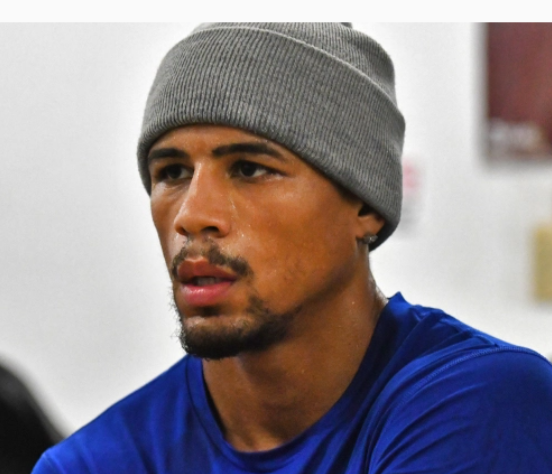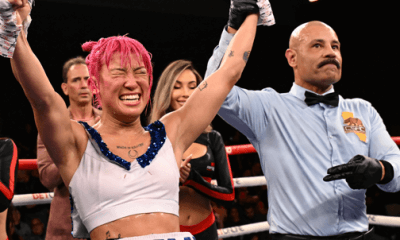Featured Articles
Lightweight Contender Jamaine Ortiz: Keeping Worcester Mass on the Boxing Map

Lightweight Contender Jamaine Ortiz: Keeping Worcester Mass on the Boxing Map
The city of Worcester in the state of Massachusetts is already on the boxing map. It was put there in the 1930’s when lefty Lou Brouillard moved to the city from Canada and fought all over New England including an astounding 25 times at Worcester’s famous downtown Mechanics Hall.
The southpaw Brouillard won world titles at welterweight and middleweight and he fought 140 bouts from 1928 to 1940. Brouillard faced many of the biggest names of his era and he was finally inducted into the International Boxing Hall of Fame in 2006. It would be another ten years until the Worcester-born Jamaine Ortiz (now 16-1-1 with 8 KOs) would make his pro debut in 2016.
Ortiz has a long way to go until he reaches the level of accomplishment achieved by Brouillard but the 26-year-old lightweight is on his way. Last month in New York City at Madison Square Garden, Ortiz lost a very competitive 12-round unanimous decision to future Hall of Famer Vasyl Lomachenko. Their ESPN+ main event was close going into the 11th and 12th rounds.
It was almost the ‘Upset of the Year’ and it’s an outside contender for ‘Fight of the Year’ honors. There’s just something dramatic about a written-off opponent rising to the occasion and beyond.
One of the ringside judges had the fight scored 115-113 for Lomachenko, this tally accurately reflecting the in-ring reality. It was also written all over the bruised faces of both competitors.
Ortiz was a 10-1 underdog and considered by most to be a mere tune-up for Loma. Promoted by Jimmy Burchfield’s CES, Ortiz has been getting work on Bob Arum’s Top Rank shows and last May he upset former world champion Jamel Herring by unanimous decision in Las Vegas.
Before sharing the ring with Lomachenko for real, Ortiz had previously sparred with the Ukrainian sensation (in preparation for Loma’s 2021 fight against Richard Commey) and his familiarity with Lomachenko’s style was evident. Ortiz used his size, his youth and his fast jab to keep Lomachenko off his game until late in the fight when Loma’s elite experience took over.
“Jamaine Ortiz is a top fighter who understands boxing,” said Lomachenko after the tough win. Lomachenko’s manager Egis Klimas also praised Ortiz and told him he will be a world champion someday.
For Ortiz, losing his undefeated record to a legend was invaluable and it will surely make him a much better fighter. The city of Worcester now looks forward to seeing just how far Ortiz can go.
If Ortiz does end up in the ring with undisputed lightweight champion Devin Haney, the boxing media will tell you it’s a mismatch. I’m here to tell you that Ortiz can beat Haney. In the amateurs, he schooled Edgar Berlanga. Against the likes of George Kambosos, I’d also favor Ortiz.
Top Rank commentator, Hall of Famer Andre Ward has been impressed with Ortiz for a while now. During his thrilling 2021 draw against Joseph Adorno, Ward said Ortiz “outworked” his opponent and deserved to win. Ward also liked what he saw of Ortiz against Lomachenko.
Technically speaking, we all did. There were times when Ortiz was outright outboxing Loma.
WORCESTER WAVE
Known as “El Gallo” (The Rooster) Jose Antonio Rivera began his boxing career in 1992 and retired from legitimate competition in 2011. During this period of time (which is known as the “Worcester Wave”) Rivera won WBA world titles at welterweight and junior middleweight.
Promoted by Don King, Rivera fought two of his four WBA title bouts at home in Worcester at the DCU Center, most notably in 2005 when he lost his WBA welterweight title by split decision to Luis Collazo.
Now a promoter in the city he helped keep on the boxing map, the 49-year-old Rivera has recently competed on his own Worcester Palladium club show undercards; once in 2018 and again in 2019. During his underwhelming but outstanding career, Rivera fought 17 of his 50 fights in Worcester where he remains a source of inspiration (and income) for local up-and-comers.
Also during the wave, popular heavyweight Bobby Harris and middleweight Sean “Irish Express” Fitzgerald were active on the scene. Harris was a beloved figure in Worcester while Fitzgerald fought the elder Peter Manfredo three times, drawing twice and beating Manfredo in 1992. Fitzgerald also faced Dana Rosenblatt and Roberto Duran, losing by knockout to both.
While the “Worcester Wave” was winding down another Worcester native was getting set to make his mark on the city—and on the world stage. In 2008, Edwin Rodriquez began power punching for pay and by 2011, “La Bomba” was blowing up on Showtime for national audiences.
Two years later in California, Rodriguez took his shot on HBO against then super-middleweight world champion Andre Ward. Rodriquez lost a wide unanimous decision but there can be no doubt that Rodriguez did his part to keep his city on the boxing map. Rodriquez retired from the sport in 2019 with a 31-2 record and he’s now a gun-toting Massachusetts State Police Officer.
“Worcester can be and is becoming one of the most active boxing areas in the country,” says Rivera’s co-promoter and former Worcester fighter Chuck Shearns. “There are no less than four boxing gyms here in Worcester within five miles of each other and lots of professional and amateur boxers throughout our city. Many of them have developed into world class talents.”
Every year, sweaty Worcester gyms churn out a new batch of young Golden Glove amateurs with big dreams of going pro and winning the world title for their city. The vast majority never make it out of the unpaid ranks and even fewer make it to the level of Rivera or Rodriguez.
A few years ago, the city put some of its hopes onto the shoulders of featherweight prospect Irvin Gonzalez. Gonzalez started his career going 12-0 before an upset loss to Elijah Pierce, a decision loss to Toka Kahn, and another surprising defeat to Edward Vazquez in Los Angeles. Unfortunately, Gonzalez has fallen right off the map and has not yet had a fight in 2022.
Another solid pro out of Worcester, Mass is light-heavyweight Kendrick Ball Jr. Ball is 19-1-2 with 12 knockouts and when he’s not in the ring working on his craft, he’s in the corner of Jamaine Ortiz working as his cutman. To be more effective in this capacity, Ball needs to invest in (or borrow) an enswell device.
To be honest, if Ortiz is to develop into a world champion, he will need to upgrade his entire corner. Ortiz needs a more seasoned trainer than Rockyson Gonzales and a better cutman than “Pepper” Ball. Hopefully his association with Bob Arum and Top Rank can help Ortiz improve his team.
ALL OVER THE MAP
For most boxing fans outside of New England, Worcester is known for its Worcester Centrum entertainment venue. Many boxing shows were hosted at the Centrum (Marvelous Marvin Hagler defended the world middleweight title there in 1983 against Tony Sibson) and that is where Sugar Ray Leonard was famously put onto his backside by Kevin Howard in 1984.
Today, the city’s brightest hope in boxing is Ortiz. Boxrec rates Ortiz at #10 in their competitive lightweight rankings. The Transnational Boxing Ratings Board (TBRB) rates Ortiz at #9 in their respected ratings. And the WBC presently rates Ortiz at #8 at 135 lbs. Before his breakout performance against Lomachenko (a somewhat controversial decision) the then-undefeated “Technician” Ortiz promised anyone who could hear him that “The Matrix” would bring out the still unseen best in him. That absolutely happened. The soft- spoken Ortiz promised a “dog fight” and to the great surprise of nearly everybody, he delivered.
Jamel Herring posted his thoughts about #LomaOrtiz on Twitter: “It’s crazy, people thought after my fight with Ortiz that he would be just an opponent for Lomachenko but I think he’s proven that he has a great skill set.”
Former lightweight champ Terence Crawford was also very impressed. “The fight was close enough to be a draw,” tweeted Bud after the UD. “117-111, that’s crazy.”
Jamaine “The Technician” Ortiz is mapping out his future and keeping Worcester on the boxing map! And while he didn’t quite “shock the world” against Lomachenko, he sure put it on notice.
***
Boxing Writer Jeffrey Freeman grew up in the City of Champions, Brockton, Massachusetts from 1973 to 1987, during the Marvelous career of Marvin Hagler. JFree then lived in Lowell, Mass during the best years of Irish Micky Ward’s illustrious career. A former member of the Boxing Writers Association of America and a Bernie Award Winner in the Category of Feature Story Under 1500 Words, Freeman Covers Boxing for the Sweet Science in New England.
To comment on this story in the Fight Forum CLICK HERE
-

 Featured Articles4 weeks ago
Featured Articles4 weeks agoThe Hauser Report: Zayas-Garcia, Pacquiao, Usyk, and the NYSAC
-

 Featured Articles3 weeks ago
Featured Articles3 weeks agoOscar Duarte and Regis Prograis Prevail on an Action-Packed Fight Card in Chicago
-

 Featured Articles2 weeks ago
Featured Articles2 weeks agoThe Hauser Report: Cinematic and Literary Notes
-

 Book Review2 weeks ago
Book Review2 weeks agoMark Kriegel’s New Book About Mike Tyson is a Must-Read
-

 Featured Articles4 weeks ago
Featured Articles4 weeks agoRemembering Dwight Muhammad Qawi (1953-2025) and his Triumphant Return to Prison
-

 Featured Articles7 days ago
Featured Articles7 days agoMoses Itauma Continues his Rapid Rise; Steamrolls Dillian Whyte in Riyadh
-

 Featured Articles3 weeks ago
Featured Articles3 weeks agoRahaman Ali (1943-2025)
-

 Featured Articles3 weeks ago
Featured Articles3 weeks agoTop Rank Boxing is in Limbo, but that Hasn’t Benched Robert Garcia’s Up-and-Comers


















